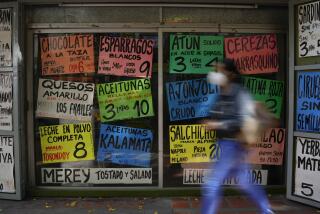THE PULSE OF EUROPE : Vital Signs: Random notes from last May’s Times Mirror survey
- Share via
In Britain: They tolerate advertising and believe in God, but they don’t pray much, and young people want to leave. . . .
* A majority of those under age 25 would prefer to live somewhere else, with the United States and Australia the favored alternatives.
* Well over half say they believe in God, but only about one in three think daily prayer is important.
* They will tolerate advertising almost anywhere--even on videotapes. But nearly half say billboards are unacceptable.
* More than one in four think the new European economic alliance coming in 1992 is a bad idea--a higher percentage than any country on the Continent.
In Germany: They don’t worry much about money, and you might never know the country has been unified. . . .
* Seven of 10 say it’s no big problem to pay their bills--a sharp contrast with those in most other countries.
* Those from the eastern part of the country are the most atheistic people surveyed--fewer than one in 10 young people say they never doubt the existence of God, for example.
* Seven of 10 former West Germans say their lives have been unaffected by unification, while nearly six of 10 from the other side of the old ideological divide say they still think of themselves first not as Germans, but as East Germans.
* Former East Germans apparently retain an unextraordinary faith in government, with an unusually low one in four agreeing that state enterprises are “usually inefficient and wasteful.”
In Russia: They’re prudish like Americans, and not very well informed. . . .
* One out of 40 believe they are leading an ideal life.
* More than half believe nudie magazines and films are harmful--putting them in the same class with Americans and out of the European mainstream.
* One in seven have never heard of the United Nations, and more than one in three have never heard of Pope John Paul II.
In Lithuania: AIDS is considered an act of God; and Andrei D. Sakharov is a hero. . . .
* More than half felt AIDS may be God’s punishment for immoral sexual behavior--the only country in which that was a majority opinion.
* More than five of every six have an unfavorable opinion of Mikhail S. Gorbachev--the lowest opinion of the Soviet president registered anywhere.
* More than three out of four rated Russian President Boris N. Yeltsin favorably--more than the two of three who favored Lithuanian President Vytautus Landsbergis. Most popular was the late human rights activist and Nobel Prize winner Andrei D. Sakharov, who was rated favorably by more than eight in 10.
Random notes from last May’s Times Mirror survey In Hungary: They’re even pessimistic about their neighbors, and they don’t think very much of lawyers. . . .
* Long known as the most pessimistic of Europeans, it now turns out that more than two of three don’t even consider their countrymen trustworthy.
* Even among those who say things are going well for them financially, only half are optimistic about the future.
* They’re the most enthusiastic about private enterprise of any East European people, with six in favor for every one opposed; two out of three like foreign investors, and one of eight specifically praise the Japanese.
* More parents would like to see their children become computer programmers (6%) than lawyers (2%).
In Poland: Brzezinski is more popular than Walesa, and both Solidarity and the Church are losing their grip. . . .
* A majority still believes that the best way to peace is through military strength.
* More Poles (49%) have a favorable opinion of former U.S. National Security Adviser Zbigniew Brzezinski than approve of the way President Lech Walesa is handling his job (42%).
* Seven in 10 describe themselves regular churchgoers--the same percentage as believes the Catholic Church plays too large a role in Polish society.
* Two out of three support a woman’s right to an abortion, and nearly three in four consider sex magazines and movies to be harmless adult entertainment.
* One in 20 say they’d like for their child to be a priest; one in five would prefer a career in medicine for their offspring.
* Only one in three say they now support the Solidarity movement which helped end Communist rule in the country, while more than one in four oppose it.
In the Ukraine: They fear starvation and want their children to become farmers. . . .
* One in 12 say they’d like to see their children become farmers, and the same percentage say they’d like the kids to own a store.
* Nearly one in eight from this, the so-called breadbasket of the former Soviet Union, list starvation as their greatest fear for the future.
* Four out of 10 don’t like their jobs.
* As many see Japan as a threat to their nation as consider the United States a potential enemy.
In Spain: They have a sunny outlook on life, sex, and the medical and legal professions . . .
* They are the most optimistic of all West Europeans.
* They exhibit some of Europe’s most liberal attitudes about sex, with nearly six in 10, for example, saying that sex magazines and movies are harmless.
* They’re mostly pacifist, even though nearly one in five says their chief concern for the future is the fear of war.
* One-third want their children to become doctors or lawyers, the highest total of any nation surveyed.
Random notes from last May’s Times Mirror survey In Italy: They embrace both Catholicism and the roght to have an abortion, and the Mafia is at the center of their fears....
* Almost as many people would like to see their children become clerks (13%) as would advise a career in medicine (15%).
* Nine in 10 consider themselves Roman Catholic, but over half say that a woman should be allowed to have an abortion if she wants one.
* One in 20 say the Mafia is the most important problem facing their nation.
In France: They still believe in liberte, but fraternite is suspect and egalite does not extend to immigrants. . . .
* They are the most pessimistic of West Europeans.
* Nearly nine out of 10 favor tougher restrictions on immigration--the highest percentage in Europe.
* Three of 10--and more than four of 10 in Paris--would like to settle somewhere else, with the United States the favored destination.
* Romanticized almost everywhere, half of French women see themselves as living distinctly second-class lives compared to French men, and four in 10 say they do no better than break even.
In Bulgaria: They’re fatalists, but mostly optimistic, and they like George Bush, Coca Cola, and artists. . . .
* Nearly three out of four--more than in any other country surveyed--believe an individual’s success is determined by forces beyond his control.
* Four of five say things have gotten worse in the last five years, but eight of 10 see better days ahead.
* They stand alone among East Europeans in voicing majority approval for their parliament.
* Three of four rate George Bush and Coca Cola highly--the most favorable ratings among a group of famous people and products.
* One of 50 designated “artist” as a desirable occupation for their children--the only Europeans besides the French to mention it.
In Czechoslovakia: It’s better to be a craftsman than a doctor, and you definitely don’t want to be a Gypsy. . . .
* One in five say they’d like for their children to become skilled workers or craftsmen--twice as many as those who want them to be doctors.
* Nine out of 10 frown on Gypsies--the highest percentage in all countries surveyed.
* Three out of four have favorable opinions of Coca Cola, Adidas, Sony, and Mikhail S. Gorbachev, but only two out of three like Mercedes-Benz. And George Bush (93%) is more popular than both the Pope (83%) and the United Nations (80%).
More to Read
Sign up for Essential California
The most important California stories and recommendations in your inbox every morning.
You may occasionally receive promotional content from the Los Angeles Times.













